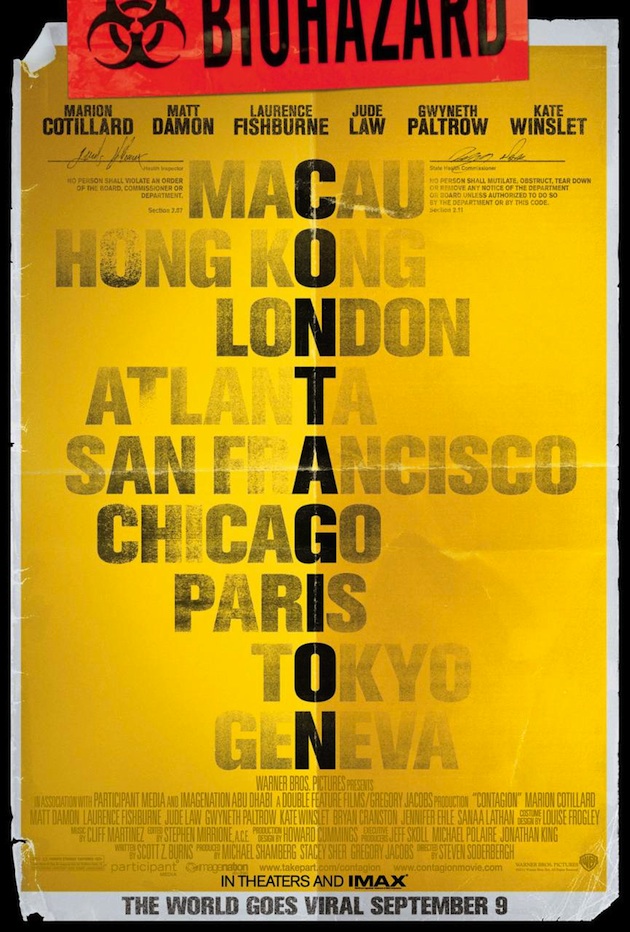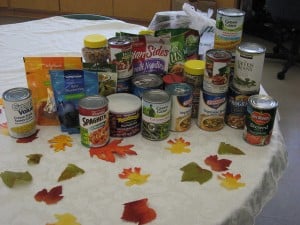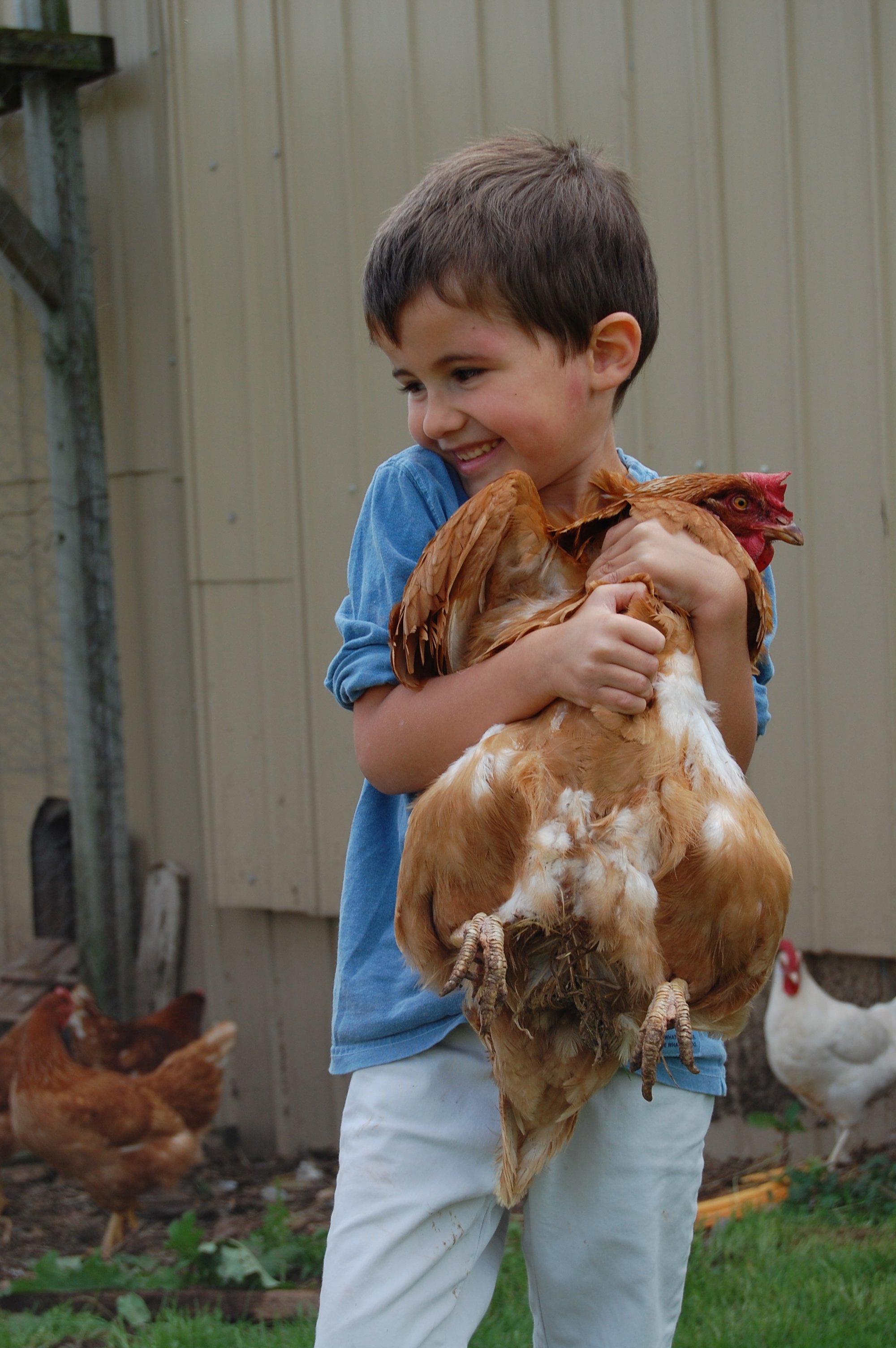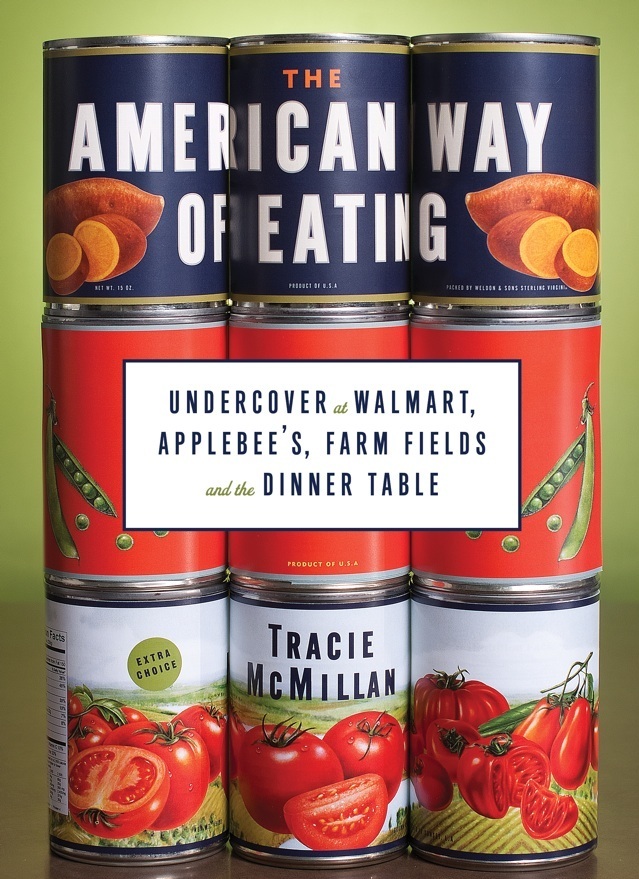 The other night we went to see Contagion. Despite the strong potential for corniness suggested in this promo poster and tagline (“the world goes viral”? seriously?), it was some good entertaining fun, although I will say that if you’re inclined to paranoia and/or hypochondria you’ll probably want to run home and take a shower, and you may find yourself resenting anyone who dares to sneeze or cough in the theater. (I made a totally fake cough sound as we were walking out, and totally scared the people in front of me!)
The other night we went to see Contagion. Despite the strong potential for corniness suggested in this promo poster and tagline (“the world goes viral”? seriously?), it was some good entertaining fun, although I will say that if you’re inclined to paranoia and/or hypochondria you’ll probably want to run home and take a shower, and you may find yourself resenting anyone who dares to sneeze or cough in the theater. (I made a totally fake cough sound as we were walking out, and totally scared the people in front of me!)
The film does a pretty good job of subtly showing the dangers inherent in industrialized agriculture. The virus that goes pandemic seems to originate, indirectly, as a result of the destruction of one species’ natural habitat and the removal of another species to a confined feeding operation. (I’m not getting more specific because I don’t want to give anything away.) Add that to the frenetic pace with which people can fly around the planet distributing their germs, and you get a pandemic.
 Now, in the film, the epidemic is not a food-borne illness; it spreads from person to person and through indirect (fomite) transmission. However, it illustrates the two aspects of our food system that make widespread food-borne illness an unfortunately strong possibly:
Now, in the film, the epidemic is not a food-borne illness; it spreads from person to person and through indirect (fomite) transmission. However, it illustrates the two aspects of our food system that make widespread food-borne illness an unfortunately strong possibly:
1. CAFOS (Confined Animal Feeding Operations)
To put in in terms that my kids would find hilarious: animal poop is great when animals are on pasture–it fertilizes the soil, which in turn makes the grass that they eat more nutritious, which in turn makes THEM more nutritious when we eat them. That’s pretty much what ruminants like cattle and goats are built to do. And when they do that, they’re pretty much healthy. But by removing animals who are meant to eat grass from grasslands, and forcing them to live in cramped, filthy conditions while feeding them biologically inappropriate diets laced with drugs, we’ve created optimal conditions for drug-resistant superbugs to develop, to say nothing of the wholesale cruelty to animals involved in this process (see Proverbs 12:10).
2. Centralization of the Food System
When just a handful of companies do most of the processing and distribution of the food our nation eats, the potential for widespread contamination is huge. A sloppy job on just one production line in one factory has the potential to kill lots and lots of people. And as we’ve learned in recent years, vegetarians are not safe: people have been killed from drinking apple juice and eating things like spinach and peanut butter. (Once, while pregnant, I got some awful food poisoning FROM A RESTAURANT SALAD that had been contaminated with raw chicken. Ew.) But while this was one isolated incident, centralization means that, as in Contagion, unsafe food can quickly sicken and kill people far and wide before we can even connect the dots and figure out what’s making them ill.
Okay, that’s scary! So what do we do about it?
 One important thing you can do is (surprise) eat local! While this doesn’t guarantee protection from contamination, eating local makes it much easier for you to KNOW more about how your food has been grown and handled.
One important thing you can do is (surprise) eat local! While this doesn’t guarantee protection from contamination, eating local makes it much easier for you to KNOW more about how your food has been grown and handled.
Other things include choosing food carefully, storing it safely, and preparing it properly, not to mention advocating for efforts to tighten regulations on food producers to help ensure better practices–even now, the USDA is not allowed to test beef for the presence of some of the most virulent forms of E. coli until consumers have gotten sick. (That will be changing in March 2012.)
The other thing that Contagion illustrates really well is how selfish interests can block the progress of measures to benefit the common good, and how fear-mongering can get in the way of efforts to protect people. But what could be more basic to “justice for all” than making sure our food supply is safe?











